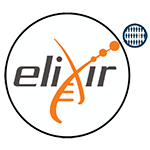|
Assessing
Molecular
Pathogenicity for
Rare
Diseases
|
|
|
|
ELIXIR Service Collection (SC) aims to thematically link tools, services, traning materials, and people, based on specific use cases.
The ELIXIR Service Collection "Assessing Molecular Pathogenicity for Rare Diseases" (AMP4RD) aims to define the procedures and guidelines
for the annotation and interpretation of the genetic variants in the human genome.
Our initiative aims to implement an integrated infrastructure for characterizing the relationship between
genotype and phenotype both from the clinical and research perspectives.
The AMP4RD SC focuses on specific scientific domains related to the study of genes, proteins and their interactions. The SC identifies the key services for delivering computing workflows and tools for the annotation and interpretation of the genetic variants. In detail our initiative aims to integrate 3 main use cases:
According to the use cases described above we defined two specific tasks for:
As final results of two year of activity, we reviewed the available resources and tools for rare disease variant interpretation (DOI:10.3389/fmolb.2023.1169109) generating a curated collection of databases and tools (DOI:10.5281/zenodo.10514594) for enhancing diagnosis of rare disease. Part of the collected resources have been labelled with a dedicated domain code on the ELIXIR bio.tools registry. |
